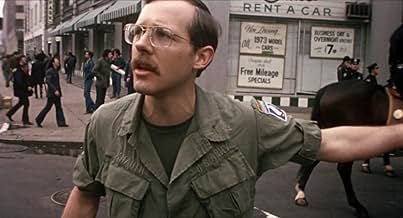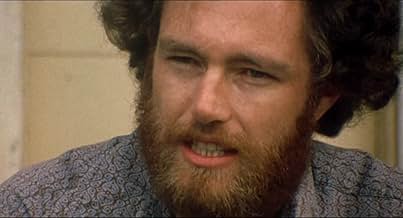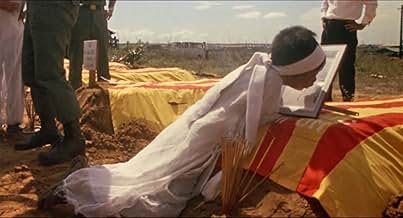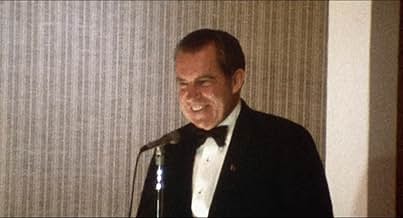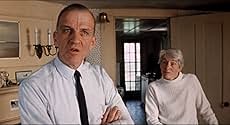IMDb रेटिंग
8.2/10
6.5 हज़ार
आपकी रेटिंग
अपनी भाषा में प्लॉट जोड़ेंA startling and courageous landmark documentary that unflinchingly confronted the United States' involvement in Vietnam at the height of the controversy that surrounded it.A startling and courageous landmark documentary that unflinchingly confronted the United States' involvement in Vietnam at the height of the controversy that surrounded it.A startling and courageous landmark documentary that unflinchingly confronted the United States' involvement in Vietnam at the height of the controversy that surrounded it.
- 1 ऑस्कर जीते
- 5 जीत और कुल 1 नामांकन
Ngo Dinh Diem
- Self - President of South Vietnam
- (आर्काइव फ़ूटेज)
John Foster Dulles
- Self - Secretary of State, 1953-1959
- (आर्काइव फ़ूटेज)
Kay Dvorshock
- Self
- (आर्काइव फ़ूटेज)
Dwight D. Eisenhower
- Self - President of the United States
- (आर्काइव फ़ूटेज)
Lyndon B. Johnson
- Self
- (आर्काइव फ़ूटेज)
- (as Lyndon Johnson)
John F. Kennedy
- Self - President of the United States
- (आर्काइव फ़ूटेज)
Robert F. Kennedy
- Self - U.S. Senator
- (आर्काइव फ़ूटेज)
William Marshall
- Self
- (as Sgt. WIlliam Marshall - Detroit)
Eugene McCarthy
- Self - U.S. Senator
- (आर्काइव फ़ूटेज)
Ho Chí Minh
- Self
- (आर्काइव फ़ूटेज)
फ़ीचर्ड समीक्षाएं
I have never been so shocked and outraged before today when I watched "Hearts and minds". We are shown stunning images of the people of Vietnam suffering from a child crying for his father, from a wife tying to get into the grave with her husband, to two sisters pained by the death of their elder sister. We were shown images of brutality from the enemies of these poor people who had absolutely nothing to show for. Their houses were set on fire, we are even shown images of the Americans kicking a man in his privates and then being smashed in the head by their weapon. It was totally shocking! Americans sleeping with prostitutes and the image that will live with me forever, was that of an American soldier shooting a young man in the head with blood gushing out and yet the camera is still rolling. Don't these people feel any shame? You get American soldiers saying they enjoyed killing those people but after watching images years later of the pain and suffering, they felt regret. It's changed my perspective forever. Something that should not have happened in the first place.
Occasionally Hearts and Minds comes over as too obvious and aggressive, as in the shockingly unflattering edits of glib, racist Americans piled one on top of another and the literal link the director draws between football and war. (Then again, I'm 31 years old and just don't know how open such racism was then, but the cuts from bigot to bigot are just brutal and perhaps it's wishful thinking on my part to assume that the director was unfair.) Also, it seems the communist NLF did no wrong that was worth putting in the film. Instead the director concentrated on eloquent nationalist sentiments. I happen to agree entirely with the assessment of the war shown in the film, but even with my sympathies it's hard not to notice that this film that concentrates so brilliantly on the suffering of real people before an evil policy focuses almost solely on the crimes of the Americans and their South Vietnamese allies. But maybe that was someone else's film to make and, at that moment in time, the director probably felt that there was enough coverage of NLF as just plain evil people. It's a small gripe about such a mammoth film. Documentary is not Truth, no retelling of an event ever is. Hearts and Minds is an unapologetically partisan film and is so much the better for being honest about it.
I'm `oriental' myself. Well, `oriental' enough that I know all those slurs and dismissive comments would have applied to my family and me. It was absolutely eerie for me to see people from Gen. Westmorland down to Americans watching parades on Main St. who had nothing but contempt for the people that to this day many swear the US was trying to save.
I'm not sure how many times I've ever seen the victim of bombing express himself outside of this film and that's sad. How many people were bombed in the last century? Millions certainly. In the US we've become so accustomed to hearing that our foreign policy requires almost annual bombings somewhere on earth. Particularly during the Clinton years, punishing through air strikes became so routine that it barely merited news coverage. These attacks may not be as indiscriminate as they used to be, but how many people in our history did that one anguished man speak for as he wept about his family and his home?
The sheer carnage on display in Hearts and Minds made the whole war film genre seem perversely sentimental to me. It's seldom helpful to hold up fiction to docu-footage, but, in this case, any number of moments from Hearts and Minds makes otherwise impressive films like Apocalypse Now! and Platoon seem like acts of bad taste.
I'm `oriental' myself. Well, `oriental' enough that I know all those slurs and dismissive comments would have applied to my family and me. It was absolutely eerie for me to see people from Gen. Westmorland down to Americans watching parades on Main St. who had nothing but contempt for the people that to this day many swear the US was trying to save.
I'm not sure how many times I've ever seen the victim of bombing express himself outside of this film and that's sad. How many people were bombed in the last century? Millions certainly. In the US we've become so accustomed to hearing that our foreign policy requires almost annual bombings somewhere on earth. Particularly during the Clinton years, punishing through air strikes became so routine that it barely merited news coverage. These attacks may not be as indiscriminate as they used to be, but how many people in our history did that one anguished man speak for as he wept about his family and his home?
The sheer carnage on display in Hearts and Minds made the whole war film genre seem perversely sentimental to me. It's seldom helpful to hold up fiction to docu-footage, but, in this case, any number of moments from Hearts and Minds makes otherwise impressive films like Apocalypse Now! and Platoon seem like acts of bad taste.
A documentary of the conflicting attitudes of the opponents of the Vietnam war.
Roger Ebert wrote, "Here is a documentary about Vietnam that doesn't really level with us... If we know something about how footage is obtained and how editing can make points, it sometimes looks like propaganda... And yet, in scene after scene, the raw material itself is so devastating that it brushes the tricks aside." Exactly right. The folks who made this are clearly anti-war, but some of the footage they get is unforgettable.
Most notably is the interview with General William Westmoreland where he says, "The Oriental doesn't put the same high price on life as does a Westerner. Life is plentiful. Life is cheap in the Orient." How can that be interpreted any other way?
The movie was chosen as Academy Award for Best Documentary Feature at the 47th Academy Awards presented in 1975. This win was not only well-deserved, but opened the door for possibly an even better Vietnam documentary: Errol Morris' "The Fog of War: Eleven Lessons from the Life of Robert S. McNamara" (2003), which also won the Oscar.
Roger Ebert wrote, "Here is a documentary about Vietnam that doesn't really level with us... If we know something about how footage is obtained and how editing can make points, it sometimes looks like propaganda... And yet, in scene after scene, the raw material itself is so devastating that it brushes the tricks aside." Exactly right. The folks who made this are clearly anti-war, but some of the footage they get is unforgettable.
Most notably is the interview with General William Westmoreland where he says, "The Oriental doesn't put the same high price on life as does a Westerner. Life is plentiful. Life is cheap in the Orient." How can that be interpreted any other way?
The movie was chosen as Academy Award for Best Documentary Feature at the 47th Academy Awards presented in 1975. This win was not only well-deserved, but opened the door for possibly an even better Vietnam documentary: Errol Morris' "The Fog of War: Eleven Lessons from the Life of Robert S. McNamara" (2003), which also won the Oscar.
I'll admit up front that Peter Davis' documentary makes no effort to show the carnage and torture sponsored and perpetuated by the Viet Cong -- and the one substantial time it explores the way South Vietnamese civilians were imprisoned and tortured by their own government (in huge numbers, by the way), the film isn't very clear about who made these arrests. It concentrates almost solely on the inhumanity and pointlessness of our presence there in a pointless war which even our leaders were unprepared to comprehend.
It's not "balanced" within itself, but given the day-to-day barrage of standard media coverage of the Vietnam war during the time the documentary was made, I believe the making of this film represented an attempt to "balance" the average American's knowledge of what was really going on and how misrepresented the war was by our government and even by the major media most of the time.
All that being said, it's a vivid, important part of the mosaic of American war records. The images are enormously powerful, and where occasionally Mr. Davis' juxtapositions seem overtly manipulative, he still is to be praised emphatically for collecting and assembling this material in such a courageous and uncompromising way. It is essential viewing because of the power of its collected imagery and the lessons about America that we still need to learn. 30 years after the Vietnam war ended, there are still too many essential ways in which that conflict is not understood....and the degree to which we cannot seem, as a nation, to learn from the lessons of Vietnam is only too evident in the manner and attitude with which our leaders have handled and carried on the American military action in Iraq.
Having read a lot of the writings of Vietnam vets over the years about this war, I'm tempted to say that this documentary doesn't go far enough to show the core of absurdity and tragedy at the heart of this war and the way it put young Americans into a hellish situation for no reason and then left them there to be a part of a morally ambivalent, politically and humanly misguided situation, forever disillusioning and haunting an entire generation. But if this film can help younger people to understand just the tip of the iceberg of the enormous tragedy of America's involvement in a pointless 10-year war, then it continues to be worthwhile.
The film itself does not provide nearly enough "backstory" for a student or younger person who did not live through the era. Peter Davis presupposes that the viewing audience knows a lot of things which we knew at the time but which is no longer general knowledge for many viewers. But as a part of an overall attempt (using various sources) to understand that war and its colossal ramifications to our country's self-image, and as a reminder of how easy it is to slip into a tragic imperialism masquerading as some other kind of naive political idealism, it's an essential and vividly effective document of the times for which we owe Mr. Davis a huge debt of gratitude. There is much to be learned from films like this -- including things which our leaders today don't seem to have learned themselves, despite having lived through the Vietnam era.
It's also important to remember that until the Vietnam war, and later Watergate (reminders of which resonate in the presence in this film of "Pentagon Paper"- leaker Daniel Ellsberg), Americans generally believed what their government told them, and didn't think Presidents lied. It may be difficult now to remember there ever was a time when we trusted our government not to be intentionally misleading us, and if Mr. Davis makes a conspicuous effort to emphasize the duplicity of Johnson and Nixon in this documentary, it's probably because it was such a new and unbelievable concept to the overwhelming percentages of Americans before the Vietnam era took place.
It's not "balanced" within itself, but given the day-to-day barrage of standard media coverage of the Vietnam war during the time the documentary was made, I believe the making of this film represented an attempt to "balance" the average American's knowledge of what was really going on and how misrepresented the war was by our government and even by the major media most of the time.
All that being said, it's a vivid, important part of the mosaic of American war records. The images are enormously powerful, and where occasionally Mr. Davis' juxtapositions seem overtly manipulative, he still is to be praised emphatically for collecting and assembling this material in such a courageous and uncompromising way. It is essential viewing because of the power of its collected imagery and the lessons about America that we still need to learn. 30 years after the Vietnam war ended, there are still too many essential ways in which that conflict is not understood....and the degree to which we cannot seem, as a nation, to learn from the lessons of Vietnam is only too evident in the manner and attitude with which our leaders have handled and carried on the American military action in Iraq.
Having read a lot of the writings of Vietnam vets over the years about this war, I'm tempted to say that this documentary doesn't go far enough to show the core of absurdity and tragedy at the heart of this war and the way it put young Americans into a hellish situation for no reason and then left them there to be a part of a morally ambivalent, politically and humanly misguided situation, forever disillusioning and haunting an entire generation. But if this film can help younger people to understand just the tip of the iceberg of the enormous tragedy of America's involvement in a pointless 10-year war, then it continues to be worthwhile.
The film itself does not provide nearly enough "backstory" for a student or younger person who did not live through the era. Peter Davis presupposes that the viewing audience knows a lot of things which we knew at the time but which is no longer general knowledge for many viewers. But as a part of an overall attempt (using various sources) to understand that war and its colossal ramifications to our country's self-image, and as a reminder of how easy it is to slip into a tragic imperialism masquerading as some other kind of naive political idealism, it's an essential and vividly effective document of the times for which we owe Mr. Davis a huge debt of gratitude. There is much to be learned from films like this -- including things which our leaders today don't seem to have learned themselves, despite having lived through the Vietnam era.
It's also important to remember that until the Vietnam war, and later Watergate (reminders of which resonate in the presence in this film of "Pentagon Paper"- leaker Daniel Ellsberg), Americans generally believed what their government told them, and didn't think Presidents lied. It may be difficult now to remember there ever was a time when we trusted our government not to be intentionally misleading us, and if Mr. Davis makes a conspicuous effort to emphasize the duplicity of Johnson and Nixon in this documentary, it's probably because it was such a new and unbelievable concept to the overwhelming percentages of Americans before the Vietnam era took place.
There are certain subjects so horrendous and so important that fictionalizing them, regardless of the good intentions of the film maker, can only trivialize them. "Schindler's List", "JFK" and "The Deer Hunter" come to mind.
Give me a good documentary any time, and this is one of the best.
It takes the silly rhetoric of our leaders and juxtaposes it with images showing the horrendous results of their short-sighted policies.
If you want to know what the VietNam war was really all about, (and why so many of us were against it,) skip "Apocalypse Now", "Go Tell the Spartans" and "Full Metal Jacket" and watch this one.
Give me a good documentary any time, and this is one of the best.
It takes the silly rhetoric of our leaders and juxtaposes it with images showing the horrendous results of their short-sighted policies.
If you want to know what the VietNam war was really all about, (and why so many of us were against it,) skip "Apocalypse Now", "Go Tell the Spartans" and "Full Metal Jacket" and watch this one.
क्या आपको पता है
- ट्रिवियाDuring his Oscar acceptance speech, producer Bert Schneider read a letter from the head of the Viet Cong lauding his film. Bob Hope prompted Oscar host Frank Sinatra to disclaim any political statements that had been made during the show.
- भाव
Daniel Ellsberg: The question used to be: might it be possible that we were on the wrong side in the Vietnamese War? But, we weren't on the wrong side. We are the wrong side.
- क्रेज़ी क्रेडिटThe listed translators credited in the movie (Le Thai To, Trung Trac, Le Thanh Tong and Trung Hung Dao) were all Vietnamese generals who had defeated the Chinese in various times from the first century C.E., to the fifteenth century C.E. The translator listed as Nguyen Ai Quoc was an early alias of Ho Chi Minh, founder of the Vietnamese Communist Party. I have no knowledge of the last listed translator, Barbara Gore. Apparently, someone played a good joke on the producers of this film, if it wasn't the translators themselves.
- कनेक्शनFeatured in Sneak Previews: Take 2: Vietnam Movies (1980)
टॉप पसंद
रेटिंग देने के लिए साइन-इन करें और वैयक्तिकृत सुझावों के लिए वॉचलिस्ट करें
- How long is Hearts and Minds?Alexa द्वारा संचालित
विवरण
- रिलीज़ की तारीख़
- कंट्री ऑफ़ ओरिजिन
- आधिकारिक साइटें
- भाषाएं
- इस रूप में भी जाना जाता है
- I frihetens namn
- फ़िल्माने की जगहें
- उत्पादन कंपनियां
- IMDbPro पर और कंपनी क्रेडिट देखें
बॉक्स ऑफ़िस
- US और कनाडा में सकल
- $28,754
- US और कनाडा में पहले सप्ताह में कुल कमाई
- $8,556
- 24 अक्टू॰ 2004
- दुनिया भर में सकल
- $28,754
इस पेज में योगदान दें
किसी बदलाव का सुझाव दें या अनुपलब्ध कॉन्टेंट जोड़ें


